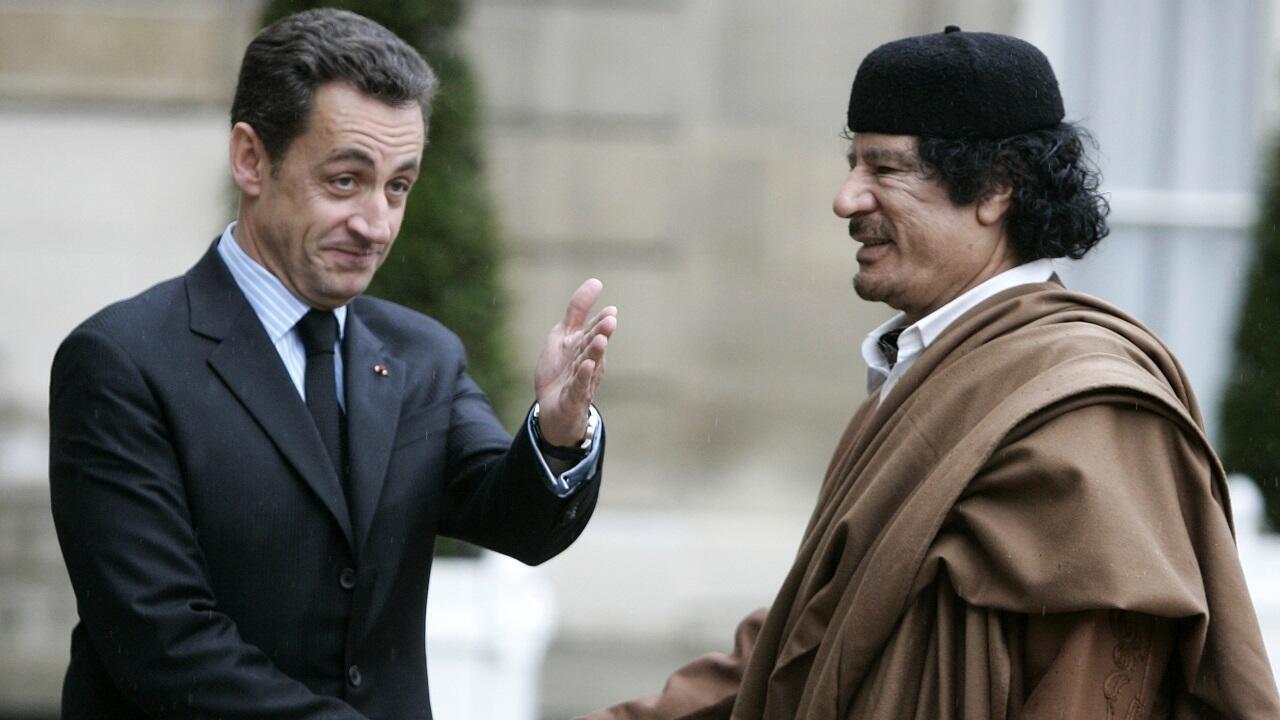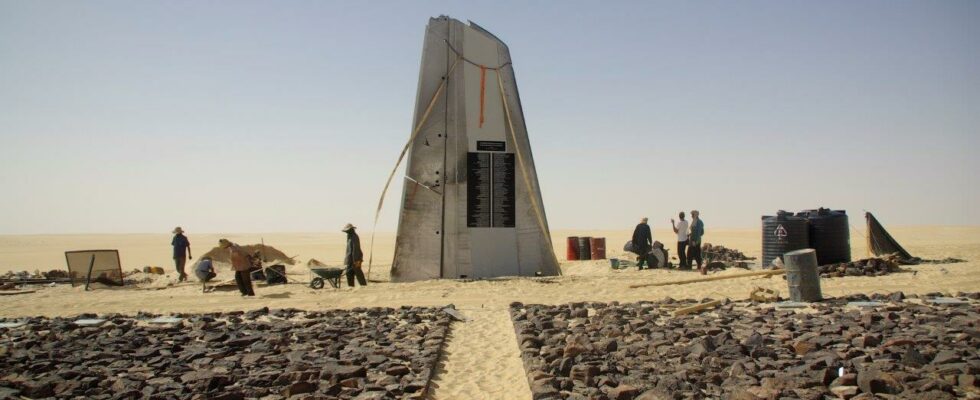“No one understands anything”, the title of the film, a bit provocative, is taken from a declaration by Nicolas Sarkozy at the Figaro Magazinein August 2023: “ The French are hard-pressed to summarize what I’m being accused of, no one understands anything. “. How journalists worked to untangle this sprawling tangle of relations between Nicolas Sarkozy and Muammar Gaddafi is the subject of this film which is released this Wednesday, January 8, two days after the opening of the trial in the so-called “Sarkozy- Gaddafi.”
Initially, the project was, for the investigative journalists from Mediapart, to make a film “ which reports on the facts established, first by the journalistic investigation, then by the judicial investigation. With the idea that it was little documented by the media, given the seriousness of the facts and the quality of the people implicated », Explains Yannick Kergoat, director of the film with Fabrice Arfi, Karl Laske and Michaël Hajdenberg.
Since the summer of 2011, the two Mediapart journalists, joined by Michaël Hajdenberg, co-director of Mediapart’s investigation department, have been filling the columns of the investigative site with their articles on the alleged Libyan financing of Nicolas Sarkozy’s presidential campaign in 2007. , among other investigations. “ It’s over 150 items » underlines Yannick Kergoat, plus a book, released in 2017 by Fayard, With compliments from the Guide. The director brought to the investigators his experience as a documentary filmmaker who works on social issues to shed light on them and spark debate. This was the case for The (very) great escape (2022) and for The new watchdogs (made with Gilles Ballastre in 2012 and of which Mediapart journalist Valentine Oberti and Luc Hermann from “Premieres Lignes” made a remake in 2022, Media crash).
How to tell such a complex affair?
The film, sequenced in chapters, takes up the investigation chronologically (with a time line). It all started in January 2011, when journalists received an email concerning Ziad Takieddine, one of the defendants in this case, says Fabrice Arfi first. With Karle Laske, they explain how they recover a hard drive containing archives from the Lebanese intermediary (“ the door opener » according to Karl Laske), thousands of various documents. A ” digital Ali Baba’s cave » according to Fabrice Arfi.
A ” serious secret »
The film opens with violent images of the death of Gaddafi in October 2011in the suburbs of Sirte. It traces the evolution of relations between the former French president and the former Libyan head of state, beyond official speeches. We remember some sequences illustrated by the mainstream media: the release of Bulgarian nurses in the presence of Cécilia Sarkozy, Nicolas Sarkozy’s first official trip to Tripoli in July 2007 shortly after his election, Gaddafi’s visit to Paris in December 2007 , the about-face in February 2011 followed by the declarations of Saif al-Islam, Gaddafi’s eldest son, demanding the money that Sarkozy had agreed to his country (his father then spoke of a “ serious secret » linking him to the French president)… but we didn’t know – unless you were an avid reader, particularly of Mediapart, described as ” pharmacy » by Nicolas Sarkozy – the parallel diplomacy which was deployed between Paris and Tripoli, Paris and Beirut more recently with the operation “Save Sarko”and the circuits taken by the possible ticket suitcases.
But like matryoshkas, these Russian dolls, each piece of the puzzle opens a door to a new business. For example, the name of Ziad Takieddine which appeared in the case of possible Libyan financing of Nicolas Sarkozy’s campaign, had already appeared in 1995 at the time ofKarachi affair and financing of the presidential campaignEdouard Balladurof which Nicolas Sarkozy was the spokesperson. This investigation is also a dive into the political backstage of the Fifth Republic, under the two mandates of Jacques Chirac then Nicolas Sarkozy. Names emerge, like bubbles on a boiling broth: Claude Guéant, Brice Hortefeux, Thierry Gaubert, Abdallah Senoussi, Alexandre Djouhri, Eric Woerth, Béchir Saleh, Bernard Squarcini, Thierry Herzog, Moussa Koussa, Choukri Ghanem… names that the judicial or police chronicle, in recent years, has brought to the limelight.
The staging is simple: the two journalists retrace the progress of their investigation on camera; between each sequence, news images or archives (photos, documents, scripts of telephone conversations, etc.) illustrate their point. The words are chosen and weighed, because the subject is hot and has earned Mediapart several legal proceedings. “Great witnesses” such as Patrick Haimzadeha fine connoisseur of Libya where he was stationed as a diplomat for several years, François Molinsnow honorary attorney general at the Court of Cassation then public prosecutor of Paris, Julia Cagéan economist specializing in the media who questions the media silence on this issue, or even Danièle Klein, founding member of the French Association of Victims of Terrorism (AVT) and sister of one of the victims of UTA plane crash in the Ténéré desert in September 1989. An attack in which the head of the Libyan secret services and Gaddafi’s brother-in-law, Abdallah Senoussi, was the mastermind.
Also readUTA DC-10: after the Mediapart investigation, we must “reopen the file”
These great witnesses shed new light on the case. Thus, “qhen François Molins comes to testify, he knows exactly what we are doing. What business are we talking about? he does not come to testify on the affair itself, he comes to testify to the attacks of politicians against justice and its democratic cost”, underlines the director.
The device had to be as simple as possible, insists Yannick Kergoat, because the story was complicated to tell, not necessarily easy to understand, very abundant. “ It comes from two things: when you do an interview with several people in a film, each time there is a different setting. And I always have the feeling that the viewer will be interested in the setting, in what we see through the window, in the green plant, etc. And when we multiply the settings like this, we also multiply the opportunity for the viewer to have their eyes and minds float a little. » In the film, the setting of the interviews, the same empty apartment, does not distract attention from the remarks made.
“ Then, I was very strongly aware that we were going to tell a story in the past tense. The investigation is closed, there are no other revelations to be made in the film other than those already established by the judicial and journalistic investigation… We had to find a present of the enunciation. And this present, in documentary cinema, very classically, space is time. If I put everyone in the same space, that means it’s at the same time. I have a unique moment in the story “.
On the importance of independent journalism
“ My intention was not to tell the story of the case, but the story of the investigation, because I think that, narratively, it is much more interesting, and then because it also testifies for me, very strongly , of the important, essential role of journalism in a democracy, of journalism when it is independent and truly free. The film also wanted to bear witness to this. This is one of the dimensions, I want to say ‘democratic’, of this story. »
Free, that is to say independent in its financing. This film, “ we did it alone with crowdfunding “. The documentary was once again collaboratively funded by donations from more than 10,000 contributors. Cinema allows total editorial independence, once the question of film financing has been resolved, unlike television, insists Yannick Kergoat. “ It was important to be able to say things as we wished while strictly respecting the presumption of innocence. »

And this freedom was all the more important because, according to the director, “ we would know nothing about this affair if Mediapart had not released the first elements, had not worked for 12 years, before the start of the procedure, the referral to an investigating judge. I think they are very much the originator of the case, as they are the originator of a number of cases. This is further proof of the importance of journalism. » An investigation carried out against all odds due to the numerous traps thrown in their way: false leads, trials, false testimonies, etc. The documentary can only briefly mention it due to lack of time.
Yannick Kergoat’s credo is: “II don’t create information, I transmit it, and I make a cinema film to make people think and spark discussion “. Beyond the articles on the site (paid), the film will make it possible to reach a wider audience, to spark debates and discussions, to provide educational work, especially since the screenings will be accompanied by journalists from the editorial staff. “ The cinema is an alternative public space, a place for debate », he told us in 2022 about The (very) great escape. “ Beyond the factual aspect of the documentary, the film has an undeniable civic function : it restores meaning and credibility to the work of investigative journalists ”, we can read on the Human Rights League website who supports the documentary.
The first Mediapart articles appeared in the summer of 2011 and the courts also took up the matter in April 2013. An investigation which confirms and amplifies what Mediapart had begun to tell, explains Fabrice Arfi in the documentary. Nicolas Sarkozy was indicted in March 2018 as part of the Libyan affair for corruption, concealment of embezzlement of public funds and illicit financing of an electoral campaign. Then in October 2020, for criminal conspiracy. A legal conspiracy, assures the former president. “ We are not judges », write in the preamble the authors of the film, who recall that “ All persons cited in this film are presumed innocent. “. The documentary, which can be viewed – without insulting its authors – almost like a detective film, sheds salutary light on this nebulous affair and provides essential keys to the trial which is opening.
